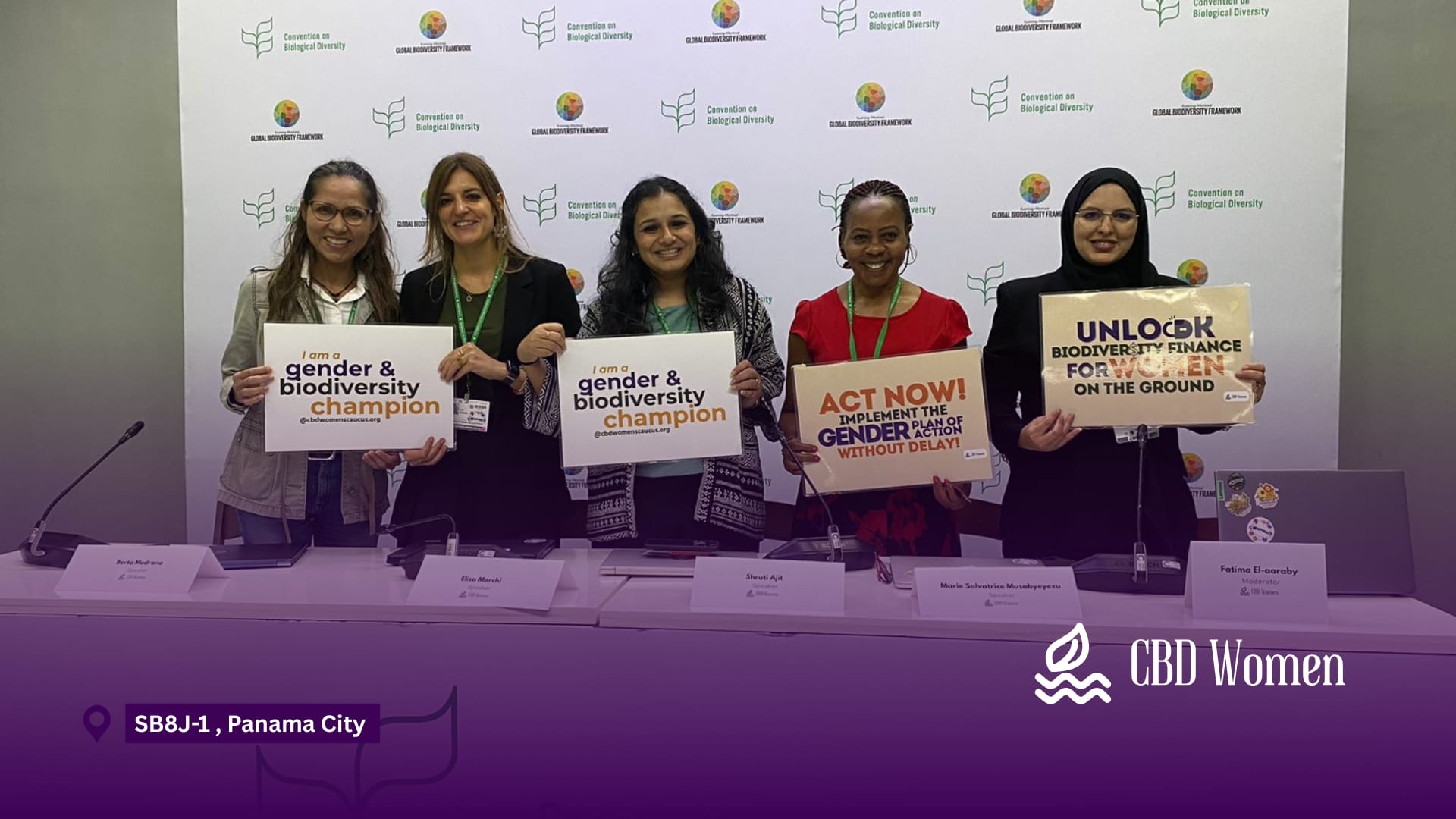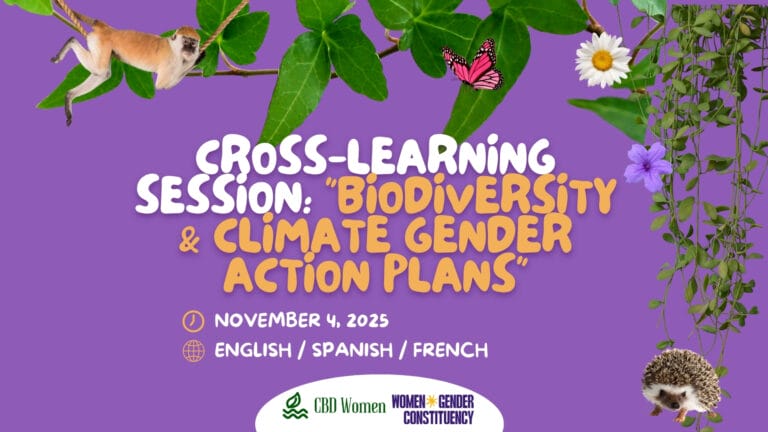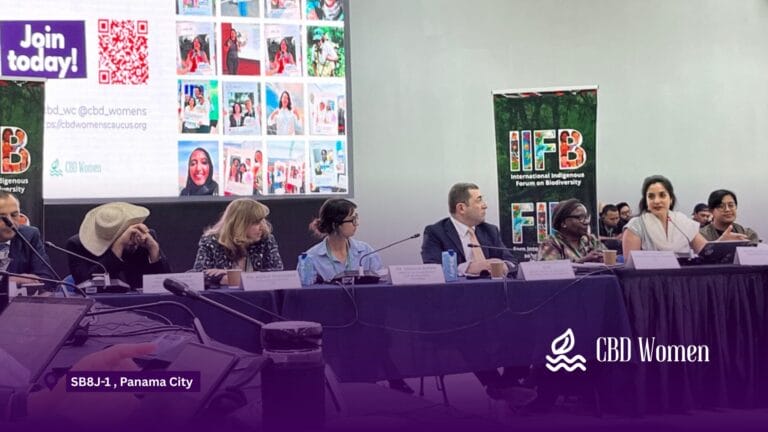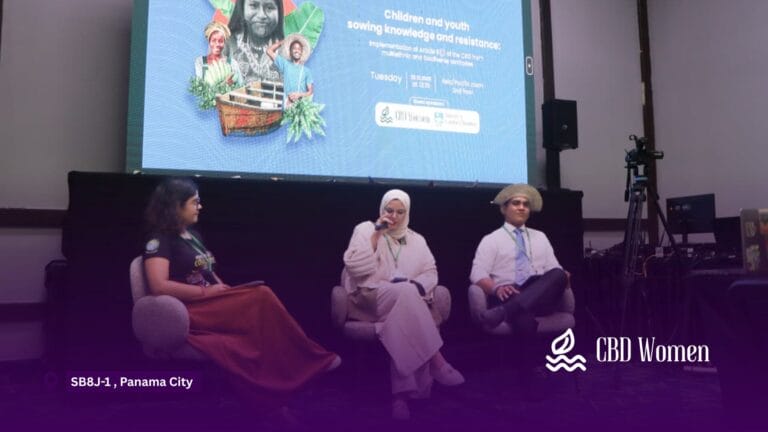Panama City, 29 October 2025 —
As the first meeting of the Subsidiary Body on Article 8(j) and Other Provisions of the Convention on Biological Diversity (SB8J-1) coming ton an end in Panama, the CBD Women’s Caucus shared its reflections on the discussions and outcomes, reaffirming the central role of women particularly Indigenous, local, and Afro-descendant women in the protection, restoration, and sustainable use of biodiversity.
Moderated by Ms. Fatima El-Aaraby, Project Officer at the CBD Women’s Caucus, the press conference brought together women experts and advocates who provided insights on key agenda items on behalf of the CBD WC, from governance and representation to knowledge systems and gender integration.
Building Inclusive and Gender-Balanced Governance
Ms. Elisa Marchi, from the University of Arizona and a member of the CBD WC, opened the discussion with reflections on Agenda Item 4: Modus Operandi.
She highlighted the historic importance of the meeting, noting that it represented a turning point in efforts to ensure the effective participation and representation of Indigenous Peoples and local communities in biodiversity governance.
Ms. Marchi emphasized that the body’s composition must ensure gender balance, regional equity, and respect for self-determined processes, as defined by the seven socio-cultural regions recognized by the UN Permanent Forum on Indigenous Issues.“This subsidiary body must guarantee the representation of Indigenous women and girls—not only as participants but as decision-makers, ensuring they have the space to share their knowledge without fear of interference or retaliation,” she said.
She also called for the creation of a dedicated financial mechanism to support Indigenous women’s participation, capacity-building, and leadership, stressing that representation without resources is insufficient for transformative change.
Embedding Gender Responsiveness in Biodiversity Implementation
Addressing Agenda Items 5(a) and 5(b), Ms. Shruti Ajit, Project Officer with the CBD Women’s Caucus, underscored the importance of embedding gender-responsive approaches into the development and implementation of guidelines related to restoration, spatial planning, and environmental impact assessment.
Ms. Ajit pointed out that women’s traditional knowledge and leadership are vital to ensuring biodiversity conservation that is both effective and equitable. She presented examples from the field where women’s engagement has transformed restoration efforts—connecting ecosystem health with food security, livelihoods, and intergenerational learning. “When women lead, restoration takes on a holistic meaning—one that includes food security, community health, and the intergenerational transfer of knowledge,” she stated.
She urged Parties to integrate gender-differentiated data, prevent gender-based violence in environmental contexts, and ensure direct access to funding for women-led initiatives.
Integrating Gender and Human Rights in the Biodiversity Glossary
Turning to Agenda Item 5(c) on updating the Voluntary Glossary of Terms, Ms. Berta Metrano from El Salvador shared that the CBD Women’s Caucus conducted an inclusive review process to ensure that the glossary reflects a strong foundation in gender equality and human rights. “A glossary that reflects equality, respect, and the interconnectedness of biological and cultural diversity is key to advancing fair and inclusive implementation,” she explained.
Ms. Metrano stressed that language shapes understanding and implementation—calling for terms to acknowledge women’s collective rights, diverse knowledge systems, and contributions to biodiversity conservation.
Recognizing Traditional Knowledge and Women’s Leadership in Reporting
Speaking on Agenda Item 6, Ms. Marie Salvatrice Musabyeyezu from Rwanda focused on the inclusion of traditional knowledge in the Global Report on Collective Progress under the Kunming-Montreal Global Biodiversity Framework (GBF).
Ms. Musabyeyezu emphasized that Indigenous and local women’s contributions, particularly in seed preservation, medicinal plants, and land restoration, must be formally recognized and integrated into national and global reporting processes. “Let us listen to the voices of the women who have kept seeds alive, preserved forests, healed communities, and sustained the balance between humans and nature,” she said.
She called for gender balance to go beyond numbers and ensure meaningful representation, with mechanisms to include youth and women’s leadership in reporting processes. Ms. Musabyeyezu also recommended the creation of an informal dialogue mechanism for collecting Indigenous women’s input and providing financial support for community-led knowledge systems.
Ensuring Rights-Based Approaches and Gender Data
Across all interventions, the CBD Women’s Caucus stressed that achieving the goals of the GBF requires integrating gender responsive and human rights-based approaches into biodiversity policy and monitoring. Without these, women’s contributions remain invisible, and inequalities persist in access to resources and decision-making. “We cannot measure what we do not count,” one speaker reminded. “Gender-responsive data is not optional—it is fundamental to accountability and equitable outcomes.”
The CBD WC reiterated that Targets 1, 2, and 3 must secure women’s rights to land, water, and natural resources, support women-led initiatives, and dismantle systemic barriers to equitable benefit-sharing.
Closing Reflections: From Policy to Implementation
In its closing statement, the CBD Women’s Caucus summarized its key messages to Parties and stakeholders:
Human rights, leadership, and knowledge of women and girls, especially from Indigenous Peoples and local communities, are central to biodiversity policy and action.
Long-term, flexible, and direct biodiversity finance must be guaranteed, with allocations for women, girls, and youth through Indigenous- and community-led funds.
Full, effective, and meaningful participation of women and girls must be ensured in all decision-making spaces, respecting self-determined processes.
Traditional knowledge, especially that of women, girls, elders, and youth, must be respected, protected, and integrated into all biodiversity-related policies and actions.
The implementation of the GBF must adopt gender-responsive indicators, gender-disaggregated data, and human rights-based approaches to ensure inclusive and equitable outcomes.




